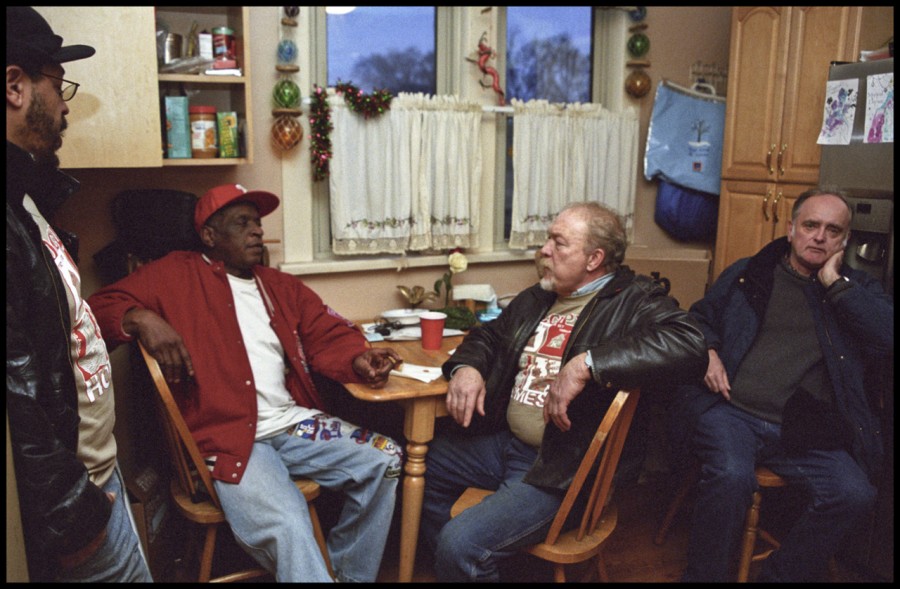The TSP team has been working to assemble a collection of thematic materials on debt for the first iterations of our books from W.W. Norton. I mentioned this to Wing and asked if that theme called any particular images to mind. At first he couldn’t think of anything. Then he had me take a look at this picture from his “We are the Other” project.

The photo shows two men, Bobby and Reggie, according to the title, sitting in a kitchen. Save the fact that the men are of different races and the haunting self-consciousness of the unnamed man on the right, I didn’t immediately understand the significance of this image, let alone its relation to debt. One could see it as a photo of a neighborly chat, a family gathering, or a work break. But then Wing shared the story behind the image.
The kitchen is Bobby’s and his house is just down the street from Wing in South Minneapolis. One of nine children, Bobby has lived in the same house since his mother bought it in 1968. On February 17th, 2012, Bobby’s house was the center of a block party called the “Foreclosure Free Fest.” Turns out Bobby, a proud 57-year-old plasterer and former Marine, had fallen behind on his mortgage after a series of health problems. This picture was taken that evening.
The event drew 300 supporters throughout the night, with a line-up of well-known local musicians who performed in his small living room and on a stage in Bobby’s front lawn. Bobby didn’t know everyone who came that night, but one person he did know was Reggie. They grew up together in South Minneapolis and met in the 7th grade “We ran the neighborhood,” says Bobby. “We fought each other and fought everyone else. But that’s the way it was, you beat someone up. and they end up your best friend.”
With coverage from ABC News and the Huffington Post, as well as the support of his friends, neighbors, and those in the Occupy movement, Bobby was able to get the Bank of America to offer a mortgage modification that will allow him to keep his home. The support seems miraculous to Bobby: “It’s like I fell in the mud and can now come up for clean air all the time.”
Bobby is, of course, one of thousands, even millions of Americans struggling with debt and foreclosure—each one with a story, each one with some friends and neighbors and support, and yet each one with little media coverage that can lead to real help or assistance as they struggle to maintain the piece of the American Dream they thought they’d already achieved.

Comments 2
Alex Casey — May 22, 2012
I love this photograph and I think it's so interesting how media coverage can make such a profound impact people receiving help or assistance. I wonder, though, what kind of research is out there about WHICH stories or families in need the media tends to focus its coverage on? If media attention acts as a catalyst for assistance, that places a lot of power in the hands of producers of media.
Gabrielly — September 19, 2012
I don t think our country is very free if only 30% of the US poiaputlon has a passport. One invisible string here may be that we have so much to offer us here that many other countries do not. For example we have many different cultural people here, so we have cultural diversity. Also, like the article mentions we have the mountains, the prairies, etc. In addition we have a better off economy than other places, and not everyone can schedule vacations out of the country because their work is very important to them. Another invisible string is the idea that it may not be safe out there. For example we re in the middle of a war, a lot of people don t want to travel at a risky time like this. Also, were not very knowledgeable of other things going on in other countries, for example: Egypt. No one wants to travel into other countries in a time of danger. Also, after September 11th 2001, many people do not like to fly. That is definitely an invisible string; people don t like to fly places like out of the country, because terrorism may always seem like a threat to them. Now, there is another issue such as the new airports that may encourage people not to fly. Now, to secure the airports more effectively; they have placed machines that see right through your clothing in order for you to board an airplane. A lot of people are discomforted by this; they feel as if that is violating their rights to privacy. An invisible string to those who don t travel, would be that their home to them seems so safe; and they ve heard many bad or dangerous things about other countries; that it is forcing them to never travel out of the country. Overall the comfort the US citizens feel, keeps them here. They feel as if everything they want and need is right inside the United States; and that there is no need for them to ever want to or need to fly out of the country. Invisible strings hold most of the poiaputlon back from the want to travel.